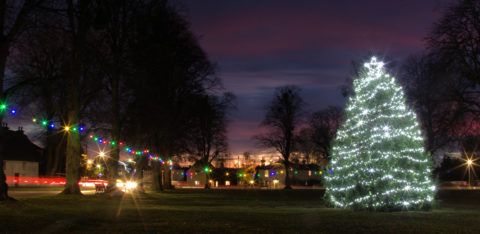
Just a short note to end an even tougher year. My family, photography, and music have kept me going, and an occasional splash of science…
Nature Matters
The original Sciencebase, founded in July 1999, following on from the Elemental Discoveries website established in December 1995

Just a short note to end an even tougher year. My family, photography, and music have kept me going, and an occasional splash of science…
Newton (in)famously split sunlight into the visible spectrum with his prism. His findings revolutionised optics but led to accusation of his unweaving the rainbow. As if that somehow subtracted from our appreciation of the natural world. To my mind, it does nothing of the sort. Knowing that white light comprises all the colours of the rainbow and these can be separated at the interface of two materials of different refractive index actually adds to the beauty.
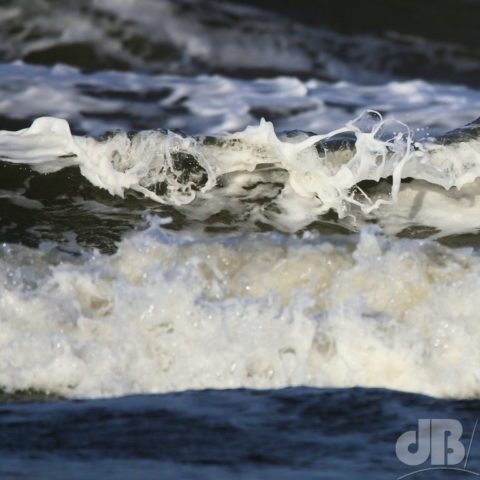
Knowing a rainbow is photons of different frequencies stimulating the cells at the back of your eyes and impinging on your brain’s visual cortex does not detract from the fact that a rainbow is still a wondrous and beautiful thing. Those with the artistic aesthetic get that as do those of a scientific bent. Those with only the artistic aesthetic don’t get the bonus of understanding the science. I’d always choose being a polymath over one or the other and many in science are both scientific and artistic. Although it often seems that too many people in the arts are less interested in the flipside of the reality perception coin.
As you know by now (surely?), I take a lot of photos. Birds, moths and butterflies, flowers, trees, beaches, sunsets, moonshots, and more. Occasionally, I’ll post one on my Instagram with a sciencey caption just for fun.
Viz, a recent trip to the North Norfolk coast in search of avian visitors such as Snow Buntings and Shorelarks, had me snapping the waves too with a short shutterspeed on the camera to capture the action. I posted a frozen wave and captioned it as “Agitated aqueous sodium chloride solution”. It is what it is. One view offered a tongue-in-cheek response: “Looks much nicer than that description.”
Well, yes, admittedly, it does. But…I assume visitors can appreciate the little chemical joke alongside the photo. It’s not a great photo and I could’ve also talked of the fractal nature of fluids in motion, fluid dynamics, hydrogen bonding, and other such matters. Knowing about such things does not take away from how peaceful and wondrous it is to simply watch all those refracted solar photons skipping over the waves as they break on a windy shore as the sun goes down. It’s not gilding the lily, it’s not unweaving the rainbow, it’s adding new layers to our understanding and appreciation of the natural world. Do you get my meaning? Do you too aspire to be a polymath or do you prefer to sit in one camp only and ignore and miss the joy of the flipside?
I just searched the Sciencebase Science blog for the word polymath and discovered that I wrote a very similar essay to the above about a decade ago, here.
UPDATE: The poll is still running today, “more science” has dropped to quite a bit less than 2/3 and “more snaps” has jumped up to well over 1/5, proportion of voters asking for “more silence has fallen a little too.
In case you hadn’t noticed, I please myself with what I post on this website and my various social media. I’ve been online since January 1989 and started my first website in December 1995. Sciencebase.com was created in July 1999 and I was on Facebook, Twitter, and the others within the first year of their public launches, if I remember rightly.
So, to iterate, I do what I do for my own entertainment, although I am always very happy if my creative output entertains, educates, or informs others.
Anyway, I initiated a twitter poll before the end of 2019 to test the water on what my 42000+ followers there wanted more of from me in 2020. Not with any intention of changing what I do, but just to see if feelings coincided with my inclinations tweetwise.
At first, the pollsters came back with a resounding “more science” call, that gradually dropped from most of them to about three-quarters and then closer to two-thirds. Very few people wanted “more songs” and a few wags wanted “more silence”. There is pleasingly a strong one-fifth of the respondents who want “more snaps”.
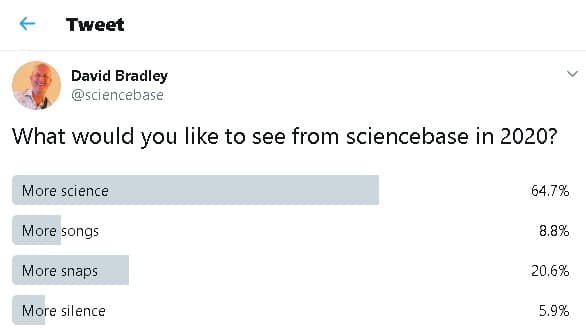
Like I say, I’m not adapting to suit other people, but I had felt that I wasn’t posting quite enough science stuff, given my origins and so there could be a few extra posts on the various topics in that realm that interest me. Where I can illustrate a science story with my own photography then I will do a little more of that too.
The songs will keep coming, even if it’s less than one in ten of voters who want more of them. Of course, everyone might just prefer the status quo…although I will not be doing any covers of that band, I hasten to add. As for more silence? Well, I’m in a choir called bigMouth, so how do you think that last option is going to pan out?
Meanwhile, for those who want even more snaps (photos) – check out the Sciencebase Instagram, at the time of writing I’d almost got to 500 followers. I’d hoped to have reached that landmark by 2020 but it wasn’t to be. 1000 by the end of the ’20s?
Edited straight from the Wikipedia entry on hermit crabs
As the hermit crab grows in size, it must find a larger shell and abandon the previous one. Many species form housing chains to get a new shell. When an individual crab spots a new empty shell it leaves its own shell and tries the vacant shell for size. If the shell is too big, it goes back to its own shell and waits near the vacant shell. As new crabs arrive, they do the same forming a group of dozens of individuals, holding on to each other in a line from the largest to the smallest crab. As soon as a crab arrives that fits the vacant shell and claims it, leaving its old shell empty, then all the crabs in the queue swiftly exchange shells in sequence, each one moving up to the next size.
The answer to the title question…because they do like to be beside the seaside, oh they do like to be beside the sea…
Eyes are a worry aren’t they? I use mine a lot…but I have all these little floater things bobbing about, I see them when I use my PC, when I’m on the phone, when I’m outside on a sunny day, sitting reading, watching TV, playing guitar, taking photos, singing.
All the time, actually.
They’re always there. I was getting worried.
Couple that to the need to find my glasses to read anything at all or look at an object any smaller than an inch across, and it’s all a bit worrying.
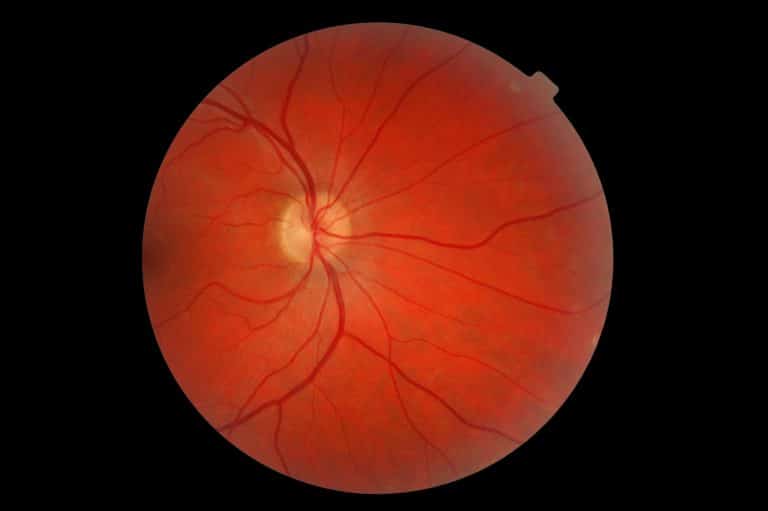
So, nice to have an eye test where nothing truly untoward is revealed, just a slight and inevitably sliding into age-related long-sightedness and a new prescription for computer glasses and reading glasses. Those floaters, apparently, I’ve not got many at all, all very normal and healthy in there. Look, here’s your retina, how healthy is that?
Oh, but there’s glaucoma in the family and my eye pressures were slightly different from each other (15 in the right eye 19 in t’other). That means I have to have a so-called “field test” Look at the tiny, faint white lights on this screen and click a button to say you’ve seen one as they illuminate randomly across your field of vision.
I was not seeing the light in the field test, well, one faint point. I was consistently missing it in the test and had missed the same point point the last time…retinal damage, something amiss? Immediate neurotic conclusion is that blindness is coming and I need to get to the hospital urgently, but also my inherent urgent not to be anywhere near a hospital despite chronic hypochondria had me making a request of the optician:
Can I do the test again just to be sure?
Of course!
So, I did it all again and this time I scored 100% for both eyes. Didn’t miss a single point of light across my visual field, so that’s good, no damage, just a transient, albeit repeated, ocular glitch. All good. Pressures tests showed both eyes the same, give or take, 13 and 14 units; smack in the middle of normal.
My new computer glasses do look a bit trendy and they let me have a Calvin Klein case for them, even though they’re not CK, so any fashion-conscious friends can feel envious. I will undoubtedly wear that at gigs so I can see my music, they’re focal length is a couple of feet, which is right for PC monitor and music stand alike.
Eyes really are a worry…
Our local primary school which taught both of our children has done a wonderful Remembrance tribute.
You can see my photos of their very different tribute from 2018 in the photo section of the Sciencebase blog here.
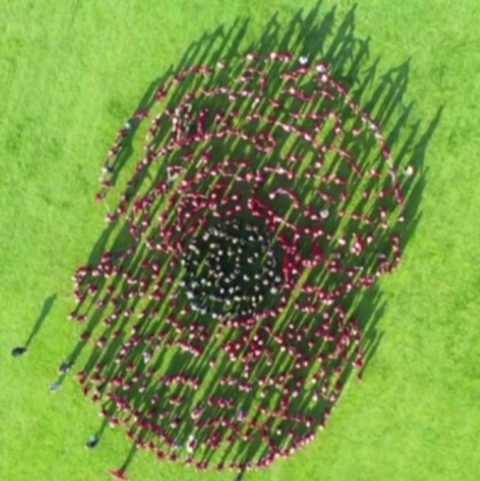
After three decades in the writing-editing trade, you get to recognise how language evolves. New words come into fashion and then fade away, some of them stick, some of them even end up being added to major dictionaries, at least in the online version and then quietly forgotten if they’re not deemed fit for the print version.
Grammar changes too. Split infinitives no longer need to boldly go anywhere; they’re fine. In fact, they always were. Usage goes through transitions and in the intermediate times between the old format and the new becoming fully adopted ambiguity reigns.
For instance, far fewer people use fewer when they mean less than they ever did…or is it the other way round less people use fewer less? Either way, the amount of people using less instead of fewer has risen. But, only if you imagine weighing all those people en masse and giving the quantity as a weight rather than actually counting them. The number of people. It’s the NUMBER OF PEOPLE. Not the amount!
But, why is that? Why do so many people seem to say “the amount of people”, when grammatically speaking the “number” is correct and “amount” just plain wrong? Why do fewer and fewer people say “fewer” when they mean less. Fewer people, not less (unless, again, you’re weighing them in bulk, or perhaps pureeing them all and measuring the total volume)?
I think the bottom line is that using the correct grammar sounds too posh and nobody but posh people want to sound posh, so the incorrect grammar becomes the common vernacular so that the non-posh sound common and the common or garden posh can affect non-poshness.
It doesn’t explain why everyone now also talks with an inquisitive inflection at the end of a statement in that Australian soap opera style. It’s as if they are unsure of themselves? And have to put some doubt into their tone? As if they’re only making an assertion gently? And, not stating something “robustly”? Or, maybe it does, maybe affecting an inferiority complex also makes one sound less affected, less posh. After all, truly posh people commonly have a superiority complex, even though we’re all born equal regardless of land rights an offshore inheritance tax avoidance schemes.
Conversely, starting a sentence with the word “So, ” makes you sound like you think you are superior. It implies that the listener should take as read all the inherent knowledge and wisdom about the subject under discussion and that if you don’t have that mentally to hand, then, well, you’re not worthy of hearing what comes after the “So, “.
So, it’s number of people, not amount, you cannot talke of less people, it’s fewer, unless they’re shrinking or you discussing weight loss and people en masse. And, why is it “water cannon”, singular? As if we’re discussing giraffe on the Serengeti rather than several vehicles with an abhorrent way of dispersing a crowd?
Robust answers on a postcard going forward, please…
Swiss researchers have looked at the pre-Brexit settlement negotiated by then UK Prime Minister David Cameron with the European Union and suggest that this was very much a missed opportunity for all parties that might have avoided the need for a referendum on the UK leaving the EU and all that ongoing problems to which that has led, despite the referendum being technically only advisory.
The voting turnout for the referendum in June 2016 was not particularly high and the result was almost equally split with a very narrow margin for the leavers rather than the remainers. Nobody was more shocked by the result than many of those who campaigned to leave other than perhaps the person who called the referendum in the first place – Cameron. He had negotiated many concessions for the UK within the EU.
The question of whether the UK should have retained its membership of the EU had vexed politicians for many years but was not particularly high on the public’s agenda despite the advent of a so-called “independence” party and the agitations of far-right, xenophobic groups with their own political agendas. Even many of the purported Eurosceptics could see the benefits of membership over the country leaving, not least avoiding the likely problem of a renewed call for Scottish independence from the UK and the issue of the border between the Republic of Ireland and the part of the UK that is Northern Ireland.
To quote Cameron:
The decision to hold a plebiscite on quitting the EU is the biggest risk taken in recent British political history.
Max de Boer of Bern Welcome and his colleagues used multi-stakeholder theory and multi-actor negotiation theory to some shed light on the negotiation process between Cameron’s government and the EU. Fundamentally, they say, “the creation of strong issue packages avoided a distributive bargain and therefore made it possible to reach an integrative bargain package based on the common interest that the negotiations are addressing European issues and not only British issues.” The negotiations were to temper the concerns of citizens regarding the politically critical and emotional topics of sovereignty and mobility. Unfortunately, the negotiations had little effect on public opinion, which was swung sufficiently towards voting to leave.
The researchers conclude with a quote from Martin Schulz, then President of the European Parliament who offered that:
"The method that 'I tell you what you have to give me so that we stay' won't work'.
There is now bitterness on all sides and at the time of writing the situation is yet to be resolved not least because the UK itself is now in complete political turmoil wherein the current Prime Minister, the second since the referendum vote, does not hold a majority nor have the confidence of parliament with regards his approach to the UK’s departure from the EU.
De Boer, M., Hausmann, N., Mendelberg, M. and Stammbach, D. (2019) ‘Cameron’s pre-Brexit settlement for the UK within the European Union: failure or missed opportunity?‘, European J. International Management, Vol. 13, No. 5, pp.662—677.
A devoutly Christian friend of mine at school whom I knew from the age of about 9 years told me…at the time…that God made all the fossils to test our faith. The question I never asked at the age of 9 years was why did God want to test our faith in the first place. If God made us as we are, put us on this planet, and wanted us to love and worship him for some strange reason, then why did it all have to be based on faith?
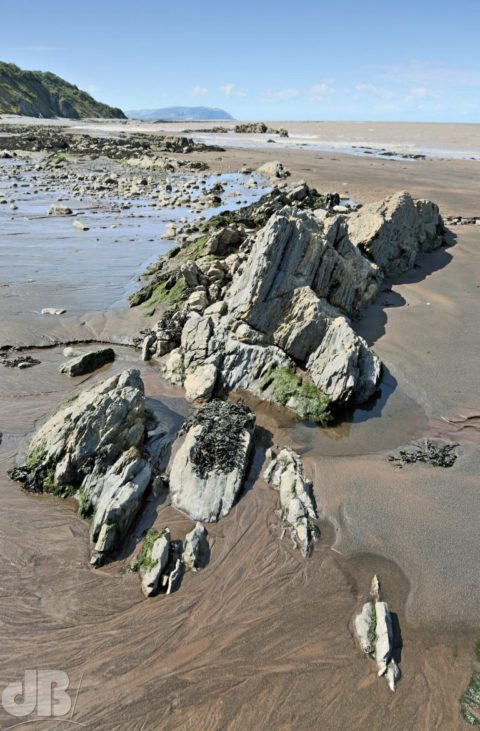
#MysteriousWays and all that, but it just seems like a pointless pursuit for an immortal, omnipotent being, doesn’t it? To create some tiny “living” entities in one’s own image that are imperfect. I don’t think there’s an answer in The Bible is there? Not really…
Anyway, it’s funny what you think about when the tide’s rising, there are endless rock falls and very little shore left to clamber over and quite a serious risk of being trapped for six hours. Oh, and the dog is stuck in a hole in a rock, is soaking wet from the sea, and you have to hoist her out thinking she may have a broken leg (she hasn’t) and then carry over the worst bit for 500 yards before we all get to a safer bit. Thank goodness for a childhood spent clambering over a rocky seashore with my schoolfriend, although Mrs Sciencebase had no such training and had to do her best.
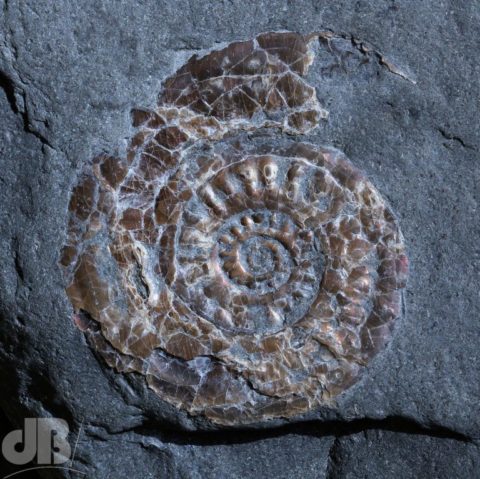
In the end, we made it, but it was close, seriously. Second near drowning on holiday in recent years. Once we got up the slipway and along the prob (no, there was no brass band playing diddly-om-pom-pom, we rewarded ourselves with some delicious ice cream from the seafront kiosk at the Driftwood cafe. There was even a tub for the dog (two quid and no spoon!).
One other thing that my schoolfriend told me back then that has stuck with me – animals have no souls. Interesting, I did wonder about that ammonite stuck in one of those chunks of rock for millions of years. Dogs are animals too, as are humans, by the way.
One more thing from this holiday blog, why did they model the statue of Coleridge’s Ancient Mariner that stands on The Esplanade in Watchet Somerset on Foo Fighters’ Dave Grohl and why isn’t he facing out to see?

Tomorrow we will take a step back in time and catch a train to save our ankles from the rocky shoreline and to save our souls from the sea.
